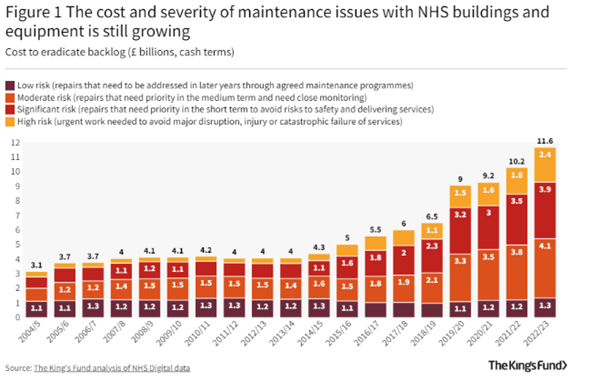The challenges
The NHS faces many complex and interrelated challenges.
Making sense of these challenges, whilst simultaneously trying to function effectively day to day and planning intelligently is a significant risk to the leadership team. It is in a perpetual state of transition because the spatial and service needs of hospitals are constantly changing.
In an era characterised by rapid advancements in technology and an ever-growing demand for improved healthcare services, the NHS faces the challenges of not only providing exceptional care but also effectively managing this vast and diverse estate.
It requires considerable expenditure to not only keep it in good condition but also continual investment to move with the spatial and service changes that it faces.
Two cornerstones of any estate are maintenance and capital projects. Here are the simple facts on both:
Maintenance:
There is a substantial backlog of maintenance and repairs across the NHS Estate currently estimated to be over £11bn. The data shows that the risk items ranked as moderate, significant, and high risk are all increasing year on year.

Capital Projects
The historic under-investment in the NHS Estate is being exacerbated as capital investment sums are being used to prop up service delivery issues.
“The NHS won’t be able to deliver faster and more productive patient care unless capital budgets are nearly doubled to at least £14.1 billion, according to a new analysis published today.”
Source: https://www.nhsconfed.org/publications/investing-to-save-NHS-capital-England
“ERIC (Estates Returns Information Collection), the annual data on the condition of NHS buildings and equipment, is back with some alarming news, especially in the context of a return to raiding capital budgets to maintain day-to-day spending.”
Source: https://www.kingsfund.org.uk/insight-and-analysis/blogs/nhs-estate-continues-deteriorate
The forecast shortfalls of £11bn and £14bn for maintenance and capital projects are likely to get worse and accelerate. And to make matters worse we are “robbing Peter to pay Paul”:
Summary
Most decisions in service delivery influence estates and vice versa. Digitisation will not solve all the problems, but strategic decision makers need integrated data and information to determine the way forward.
Most data will allow decision makers to understand the interdependencies between the estate and service delivery. It will vary for each NHS Trust as they are all different, but a solution will emerge through the consistent use of the data.


